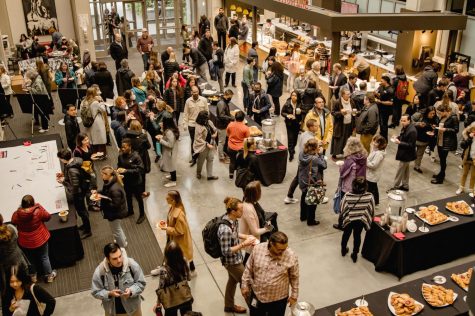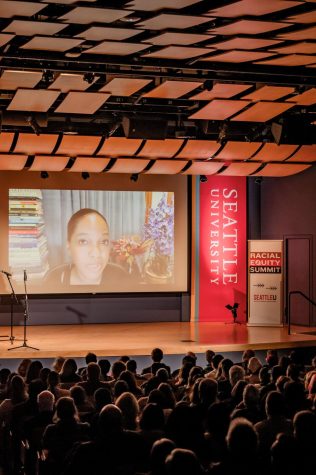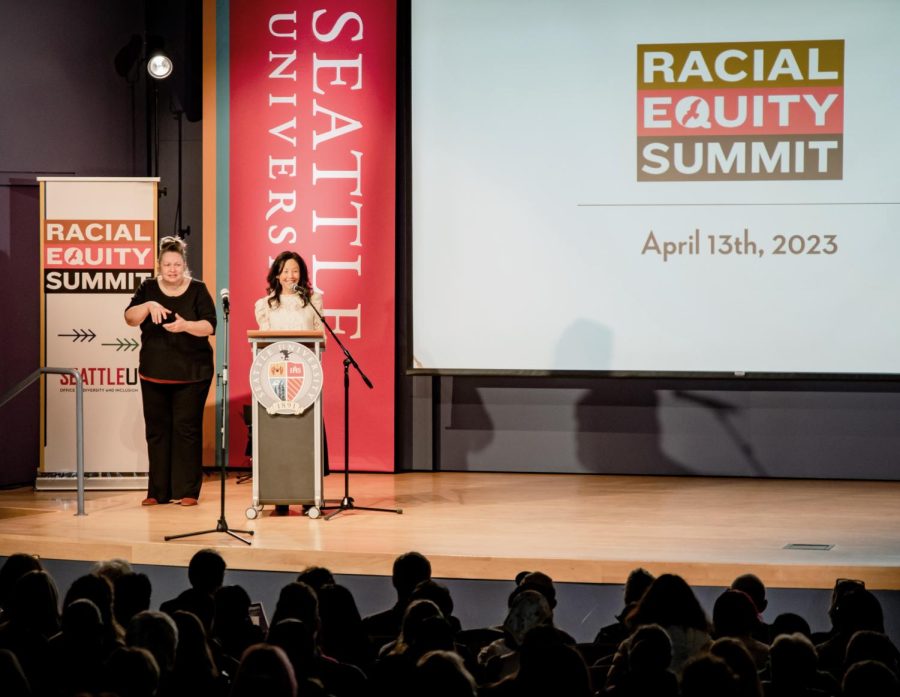Racial Equity Summit: A Plateau From Which to Build
Dr. Sharon Suh, Seattle University professor, leading the audience through a short meditation.
Well-attended, Seattle University’s second biannual Racial Equity Summit saw the Pigott atrium and auditorium packed with students, faculty and staff. However, even with powerful messages and important speakers like National Book Award winner Imani Perry, it still left some attendees asking for more.

The summit began at 8 a.m. Thursday, April 13 and lasted until 1 p.m.. Morning classes were canceled, with the notable exception of nursing students who had their classes as usual. Split into two main sections, the first event of the day happened in the Pigott Auditorium with a number of speakers taking the stage, and the second was a wide variety of “freedom school” sessions, which took place throughout Pigott classrooms.
Isiah Martin Lopez, a third-year political science major, is the financial advisor of the Black Student Union and was a speaker at the summit. Given its early start and a track record of low attendance rates at Seattle U events, Martin Lopez was concerned about the possibility of a small audience.
“Honestly, I thought it was going to be 50 people showing up,” Martin Lopez said, indicating that he was blown away by a turnout that greatly exceeded his expectations.

Martin Lopez has been an outspoken Black and Mexican leader on campus throughout his time at Seattle U, with significant involvement in social justice and racial equity movements. He was honored by the opportunity to speak at the summit.
“You can’t describe [racial equity] in one sentence or a paragraph. It demands discussion. If anything, the event deserved much more than just one day.” Lopez said, though he nonetheless had significant praise for what the summit was able to accomplish.
Not everybody was as engaged. A few of those in attendance throughout the auditorium were either asleep or on their phones during the keynote.
Imani Perry, the keynote speaker, was present on Zoom and projected onto a large screen in front of the audience. Some attendees expected Perry to speak in person, and a notable drop in energy came when Perry appeared on screen rather than on stage.
A large part of the conversation before Perry’s digital appearance was hosted by school administrators like Provost Shane Martin, Jesuit Rector Fr. Arturo Araujo, S.J. and President Eduardo Peñalver.
While this programming offered tangible information, the main event was Perry. Kayla Downing, a second-year political science major, was eager to hear the keynote.
“There were way too many talking heads who came on stage before we actually got to what we were there for,” Downing said.
There were several speakers who read poems or social recognition statements, but Downing was dismayed by the tenor of some administrative statements.
“I think it is astounding for the Provost to talk about reproductive sexual health issues when the school literally provides none of those for their students… something that also overwhelmingly affects students of color,” Downing said.
As a Catholic university, Seattle U is constrained in how much funding and marketing can be allocated to contraceptives and other sexual health resources due to the papal encyclical “Humanae vitae” causing complications in Catholic discourse on reproductive ethics. There have been decades-long racial disparities in regards to reproductive health in the U.S.. These disparities include contraceptive use, STIs and STDs, as well as human papillomavirus vaccinations, particularly for college-aged women.
The main positive Downing noted were the freedom school sessions, which resembled breakout classes led by different faculty. Christina Roberts, an English professor and member of both the Nakoda and Aaniiih Nations, led one of these sessions and focused her program on settler colonialism.
The value of the “freedom school” sessions was in the variety and diversity that they offered. Roberts chose to lead a session because the nature of racial equity is not, and can not just be, about one particular group without acknowledging the intersectional reality of American life.
Keynote events held earlier in the day led to a late start of the “freedom school” sessions. Roberts found the time cut challenging.
“I didn’t have enough time between sessions to clear my head. I even forgot to introduce myself during my second session… it was very fast and felt like we had to try and compress a lot of things, missing out on authentic engagement,” Roberts said.
While attendance for the summit exceeded expectations, some participants still saw room for improvement. As the summit is biannual, Seattle U has an opportunity to make changes and bring back an even better experience next year.











